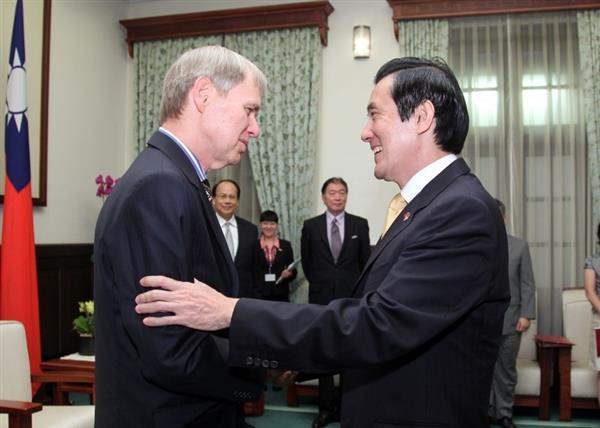News & activities
 News releases
News releases
President Ma Ying-jeou met on the morning of June 22 with Dr. Richard C. Bush, Senior Fellow at the Brookings Institution and Director of the Center for Northeast Asian Policy Studies at Brookings (CNAPS), and the two exchanged opinions on a broad range of issues, including cross-strait ties and relations between Taiwan and the United States.
President Ma praised Dr. Bush as a renowned China expert who is extremely knowledgeable about the state of cross-strait relations. Dr. Bush has published a number of books and articles that have been closely read in the American academic community. The president commented that prior to his inauguration in May 2008, Dr. Bush had already raised many viewpoints on cross-strait issues and his views remain cogent today.
The president reiterated that "mutual non-recognition of sovereignty and mutual non-denial of authority to govern" is an important concept, and a very good way to describe the current state of cross-strait relations. President Ma pointed out that the two sides have signed 15 agreements, and if neither side recognizes the existence of the other, this would contradict reality and logic. Meanwhile, the constitutions of both sides leave little leeway for mutual recognition, but the two sides can at least refrain from denying the other's authority to govern. President Ma stressed that this position does not run counter to the ROC Constitution's position on the relationship between the two sides, adding that the ROC Constitution is the highest law of the land.
President Ma stated that prior to taking office he advocated a defense budget equivalent to 3% of Taiwan's GDP. However, the global financial tsunami and economic recession occurred as his government was drafting its first budget in 2008, significantly impacting budget plans. Last year, Taiwan achieved economic growth of 10.88%, and due to the larger size of the economy, the 3% goal was again not reached. Nonetheless, the absolute size of Taiwan's defense budget is still higher than it was two years ago and funds to acquire arms from the United States have been arranged for. President Ma also mentioned that the Ministry of National Defense is hoping to introduce a volunteer army according to its timetable and is working to overcome funding difficulties. The president said that the experience of the United States shows that a volunteer army makes for better quality and morale in the army. However, this system will require a considerable increase in the defense budget. The government will closely monitor and refer to the experience of the United States in this respect, he added.
President Ma also pointed out that cross-strait relations are presently moving forward in a climate of stability. Taiwan and mainland China are currently in talks on investment guarantees, a dispute settlement mechanism, and nuclear safety. In addition, Taiwan will allow mainland Chinese tourists to travel independently in Taiwan starting on June 28. Besides increasing business opportunities, the president said he hopes this will enable more mainlanders to get a more in-depth look at Taiwan, thereby fostering mutual understanding.
The president mentioned that a first group of degree-seeking mainland Chinese students will be allowed to come here in September to study. Due to various restrictions, this group is fewer in number than was hoped for, but it is a start. President Ma said it is important to get the system up and running, and then work on honing it. In the meantime, there were 5,600 mainland Chinese non-degree exchange students studying here last year, and the number this year could be even higher. Exchange students stay here for a shorter period, usually about one semester, but the experience is still valuable to them, the president said, adding that many schools have responded positively to the program.
President Ma remarked that last month he held a video conference with the Center for Strategic and International Studies, a think tank based in Washington D.C. During the conference he specially mentioned strengthening three lines of defense for the ROC. The first line of defense is the institutionalization of cross-strait rapprochement, since once such systems are in place, any attempt to make an abrupt change to the status quo would cause great disruption, and such change would come only at a high price. The second line of defense is enhancing Taiwan's contributions to international development, while the third is aligning Taiwan's defense with diplomacy.
Lastly, the president told Dr. Bush that the ROC hopes to be included in the US Visa Waiver Program and to sign a bilateral extradition agreement. The ROC also hopes that the United States will sell F-16C/D series fighter jets to Taiwan to replace its aging aircraft and to help maintain its combat ability.
Dr. Bush was accompanied to the Presidential Office by Deputy Foreign Minister Lyushun Shen (沈呂巡) to meet President Ma. Also attending the meeting was National Security Council Deputy Secretary-General Chih-kung Liu (劉志攻).



